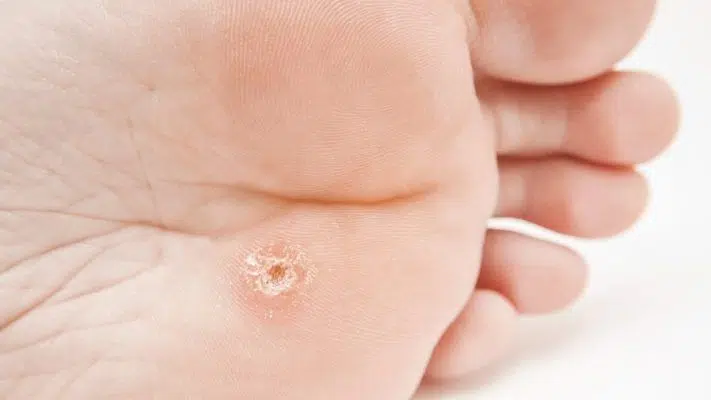 Corns are an extremely common foot complaint that affects many people. They are a build-up of thick skin (hyperkeratosis) that can occur on the tops and in between your toes as well as the soles of your feet. They form as a result of friction or pressure either from footwear or due to poor foot biomechanics.
Corns are an extremely common foot complaint that affects many people. They are a build-up of thick skin (hyperkeratosis) that can occur on the tops and in between your toes as well as the soles of your feet. They form as a result of friction or pressure either from footwear or due to poor foot biomechanics.
The corn is a particular focal point of pressure and can form underneath calluses, which can be quite painful as it presses against the inner layers of skin and closer to nerve endings.
Corns found on the toes and soles are commonly known as hard corns whereas corns found between your toes are typically referred to as soft corns.
They are often misdiagnosed as warts. As the treatment for each condition is vastly different misdiagnosis and subsequent incorrect treatment can lead to considerable short and long term, permanent complications.
Painless removal of Corns
At the Optimum Care Foot and Ankle Clinic we are experienced and trained to accurately diagnose corns and have an extensive range of treatments to painlessly remove them, along with ways to manage and relieve any discomfort they may produce. The preferred method will be for our highly qualified podiatrists to remove the callus with appropriate podiatric equipment. This will ensure that the callus is removed and a return to suppleness of skin occurs.
Corns are removed similarly. The podiatrist takes the necessary time and care to ensure the center point or nucleus of skin has been removed. Once this treatment is performed there is often immediate relief for the sufferer from their corn.
Appropriate podiatric equipment will also be used to smooth over the callus and corns. This will enable a smoother transition from affected areas to regular skin. Our podiatrist will also conduct footwear and biomechanical assessments to determine the reason you developed the corns/calluses. From that, recommended appropriate treatment plans to manage and prevent them in future. Preventative options such as footwear, orthotics, shoe inserts, padding and pressure relief devices will be suggested. Contact us on 03 9077 5915 for further assessment and treatment.
